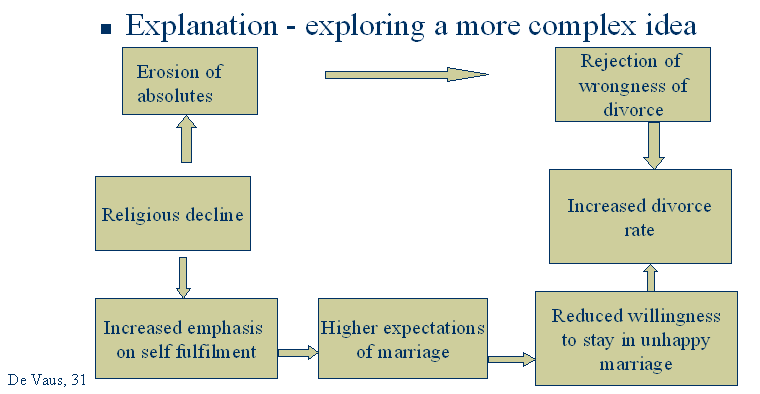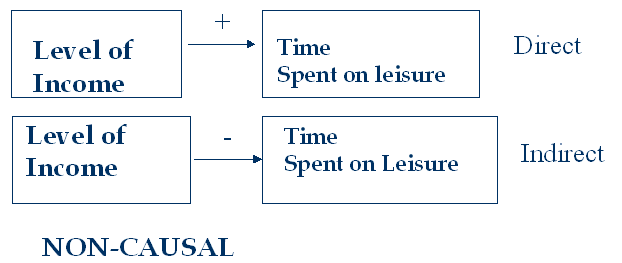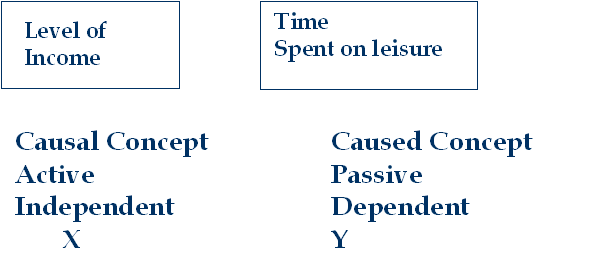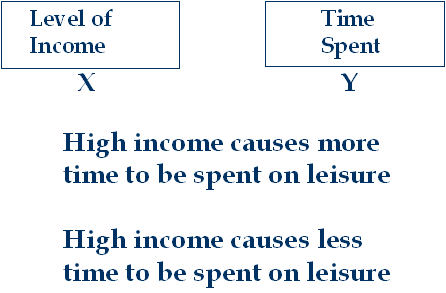Starting points
Narrowing and clarifying
Stating the problem
|
|
Explanatory research |
|
|
Hypothesis |
-
Non-causal/Causal
Descriptive research
-
Research Objective
Slide 1
LIS 570
Phase 1: Step 1
Selecting, narrowing, formulating a problem
Slide 2
Outline
|
|
Starting points |
|
|
Narrowing and clarifying |
|
|
Stating the problem |
|
|
Explanatory research |
|
|
Hypothesis |
Non-causal/Causal
Descriptive research
Research Objective
Slide 3
Asking the right questions
Research is a disciplined way of answering questions
Researchable questions
limited in scope, narrowed in focus and confined to a certain time place and set of conditions
some objective, tangible, countable evidence or data can be gathered which are relevant to the question
Slide 4
Narrowing and clarifying the problem
Starting point
Select a problem
Something vexing, perplexing, unknown
Suitable for empirical research
Narrow and clarify the problem
Slide 5
Narrowing and clarifying the problem
What do I want to know about this topic?
Description or explanation?
Descriptive research (De Vaus)
What is the time frame of our interest?
What is the geographical location of our interest?
Are we aiming for broad description or do we want to compare and specify patterns for subgroups?
What aspect of the topic are we interested in?
How abstract is our interest?
Slide 6
Narrowing and clarifying the problem
Explanation
Are we looking for causes or consequences?
? -> Increase in divorce rate
Increase in divorce rate -> ?
Slide 7
Narrowing and clarifying the problem
Explanation
List possible causes or consequences and then collect relevant data
previous research
the facts
our hunches
talk to informants
Slide 8
Narrowing and clarifying the problem
Explanation - exploring a simple idea
e.g. instead of asking what has caused? We ask has X caused?
Decline in religion -> increase in divorce
Slide 9
Narrowing and clarifying the problem
Explanation - exploring a more complex idea

Slide 10
Narrowing and clarifying the problem
Summary..
For descriptive research be clear and specific about what you want to describe
For exploratory research ask..
What am I trying to explain?
What are the possible causes?
Which causes will I explore?
What are the possible mechanisms?
Slide 11
“unpacking” the question (Bouma)
What are the major concepts?
What is happening here?
What are the issues?
Is one thing affecting, causing or producing a change in something else?
Why is this so?
Consult what has already been written or researched about the problem
Slide 12
Unpacking the question
Identify and note the many issues about the problem that you have chosen and make the choice to study one.
Then….Clarify the research question(s)
Restate the issue as a researchable question
hypothesis
research objective
Slide 13
Hypothesis
“. . Asserts a Relationship Between Concepts”
Expectation about Events
Exists/Does Not Exist
Level of Income -> Time Spent on Lecture
There is a relationship between level of income and types of activities engaged in
Slide 14
Types of Relationships
Hypotheses Assert a Type of Relationship
Positive (Direct) Relationship
Negative (Indirect)

Slide 15
Non-Causal Relationship Words
Related (Relationship)
Associated (Association)
Correlated
Linked
“Goes with”
Income is positively associated with time spent
There is a negative correlation between income and time spent
There is no association between income and time spent
Slide 16
Causal Hypotheses
Asserts that one Concept (Idea) is the cause of the other
Level of income determines time spent

Slide 17
Types of Causal Hypotheses
Positive/Negative

Slide 18
Establishing Causality
Three Basic Requirements
A relationship between the concepts needs to be established
Has to be the correct time order
All other reasons for the relationship must be able to be eliminated
Ed Level
Health Aware Time
Slide 19
Causal Words
Determine - The Level of Income Determines Time
Affect
Effect - The Level of Income Has an Effect on Time
Influence - Level of Income Has a Negative Influence
Decrease/Increase
Leads to
Slide 20
Summary
Hypotheses can take many forms
Causal/Non-Causal
Positive/Negative
Relationship Exists or Does Not
Causal hypotheses distinguish between caused and causal variables
Causal Caused
X Y
Independent Dependent
Slide 21
Research Objectives
When the goal of the research is descriptive rather than explanatory
To determine the leisure time activities of people
To determine the types of activities engaged in
To determine the amount of time spent on leisure time activities
Slide 22
Summary
Without a clear statement of the problem, the research undertaken will be confused and ambiguous. It is impossible to proceed to the next stage of the research process in a satisfactory way without such a statement.